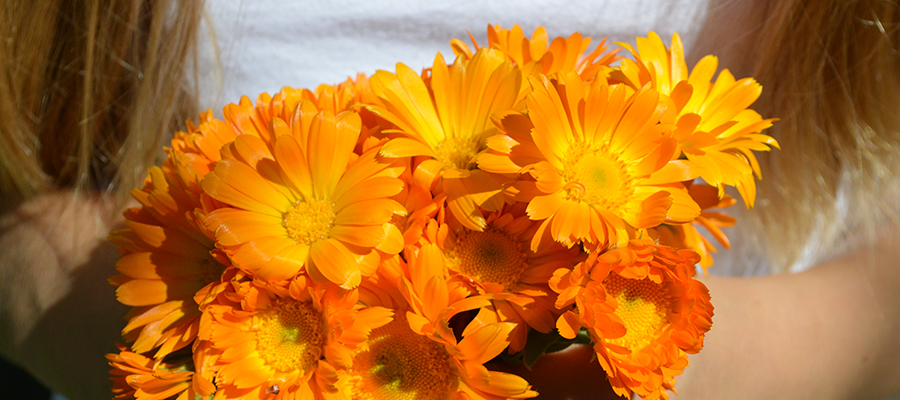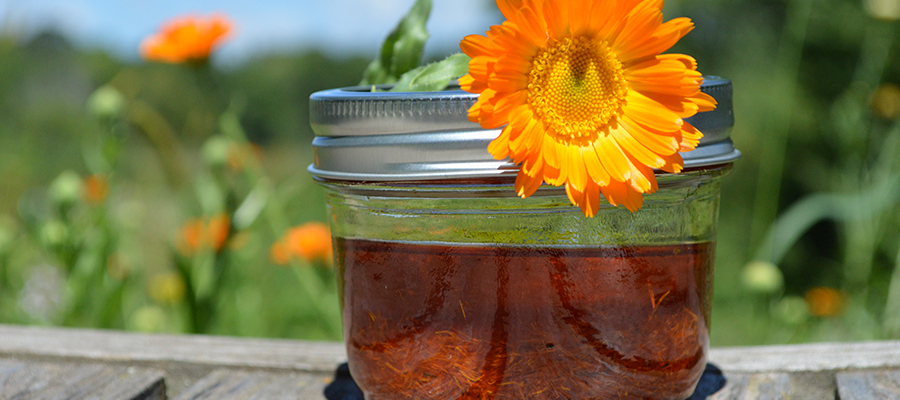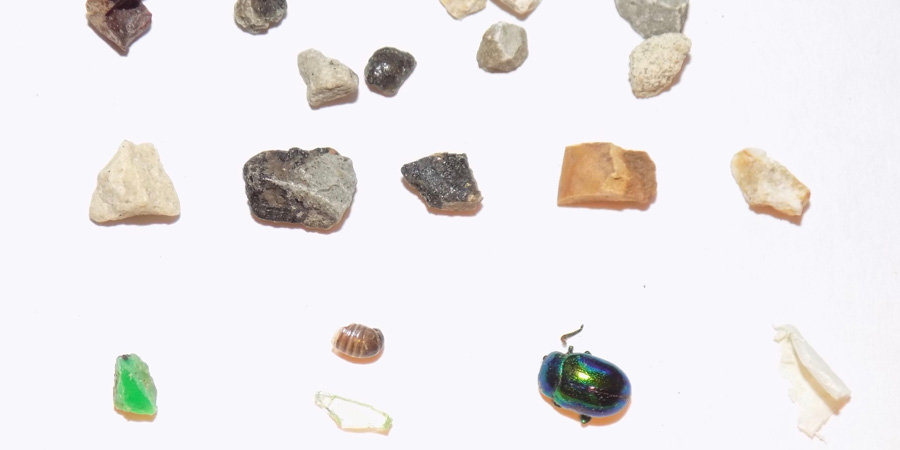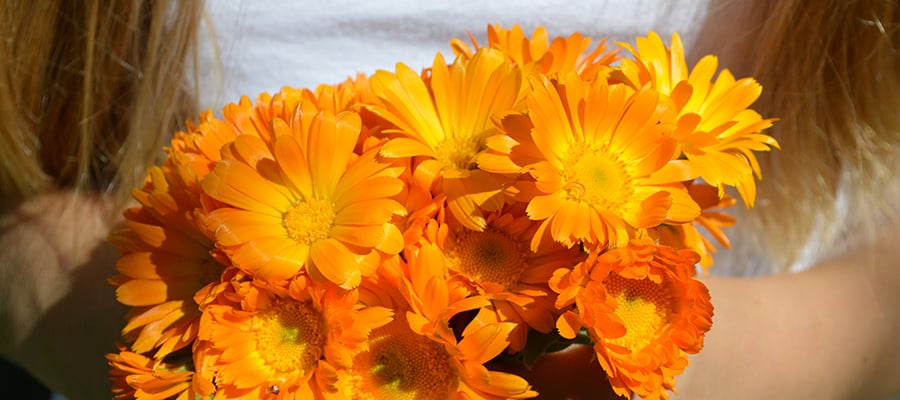
Photo Credit: Kimberly Konkol
Calendula officinalis (L.), has a beautiful golden flower and provides us with many therapeutic benefits. Calendula is well-known for it's amazing skin-care properties. Oil infusions and tinctures are both simple ways you can capture the healing properties of calendula for use on the skin. To learn more about how to make a calendula oil infusion read this blog, and to make a successful herbal tincture, read this blog.
Another incredibly simple way to improve skin health from calendula is by eating the golden petals. Calendula petals are filled with carotenoids and flavonoids, which is what gives them their brilliant golden colors. These carotenoids and flavonoids that give plants their brilliant variety of colors, also protect them from the sun. As we include them in our diet, they are distributed in our skin, helping protect our skin from the sun; just as plants are protected. Not only are they protecting our skin from damage from the sun, they are also repairing previous sun damage. [3] [4] [6]
Although research hasn't shown an association between the color of calendula petals and the amount of flavonoids they contain, it has shown there is a difference with the amount of carotenoids. The bright orange color of calendula is primarily due to lycopene, which is absent in the yellow varieties. Beta carotene was found in both the yellow and orange petals. Our skin is enriched with both lycopene and beta-carotene. The vibrant golden calendula petals are filled with both of these.
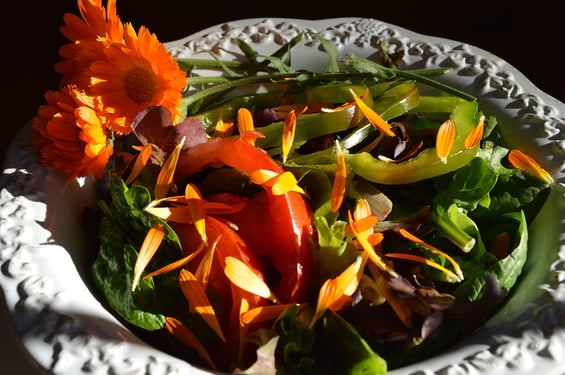 Calendula in salad. Photo Credit: Kimberly Konkol
Calendula in salad. Photo Credit: Kimberly KonkolResearch is not only showing the carotenoid content in calendula petals, it is also showing how carotenoids protect our skin. The protection we receive from the sun, along with repairing previous damage, depends on how much carotenoids we consume and also the length of time. It was shown that it takes several weeks of consuming 30 mg of beta-carotene to improve skin health. Facial wrinkles and skin elasticity was shown to improve after consuming beta carotene for 90 days. [1] [5]
As we include a variety of brightly colored vegetables, fruits, and a few flowers in our diet, we are helping protect and improve the quality of our skin. Calendula is very easy to grow, and is a fun and beautiful way to increase our carotenoids and flavonoids.
Calendula Safety
Although calendula has been shown to be very safe, those who are pregnant are advised not to use Calendula orally or topically. Calendula can also cause allergies with some people who are sensitive to the Asteraceae family, such as ragweed, chrysanthemums, marigolds, and daisies.
Although Calendula can be effective at healing skin tissue and preventing infection, it should not be used on wounds where infection is present or on wounds that are deep. Calendula can heal the top layer of the skin quickly, trapping in the infection
References
[1] Cho, S., Lee, D.H., Won, C.H., Kim, S.M., Lee, S., Lee, M.J., & Chung, J.H. (2010). Differential effects of low-dose and high-dose beta-carotene supplementation on the signs of photoaging and type I procollagen gene expression in human skin in vivo. Dermatology, 221(2):160-71. doi: 10.1159/000305548
[2] Mishra, A. K., Mishra, A., & Chattapadhyay, P. (2010). Calendula officinalis: An important herb with valuable therapeutic dimensions - An overview. Journal of Global Pharma Technology, 2(10). doi: 10.1234/jgpt.v2i10.288
[3] Raal, A., & Kirsipuu, K. (2011). Total flavonoid content in varieties of Calendula officinalis L. originating from different countries and cultivated in Estonia. Natural Products Research, 25(6):658-662. doi: 10.1080/14786419.2010.528417
[4] Sausserde, R., & Kampuss, K. (2014). Composition of carotenoids in Calendula (Calendula Officinalis L.) flowers. Foodbalt, 13-18. Retrieved from https://llufb.llu.lv/conference/foodbalt/2014/FoodBalt_Proceedings_2014-13-18.pdf
[5] Schagen, S.K., Zampeli, V.A., Makrantonkai, E., & Zouboulis, C.C. (2012). Discovering the link between nutrition and skin aging. Dermato-Endocrinology, 4(3):298-307. doi: 10.4161/derm.22876
[6] Stahl, W., & Sies, H. (2007). Carotenoids and flavonoids contribute to nutritional protection against skin damage from sunlight. Molecular Biotechnology, 37(1):26-30. doi: 10.1007/s12033-007-0051-z
About American College of Healthcare Sciences
 Founded in 1978, ACHS.edu is a Portland, Ore.-based, accredited college offering online, on-campus, and study abroad integrative health education. With undergraduate and graduate degrees, diplomas, certificates, and continuing education units in integrative health, ACHS makes holistic health and wellness education accessible to a diverse community, including healthcare professionals, military students, stay-at-home parents, and lifelong learners. Specializations include aromatherapy, herbal medicine, holistic nutrition, wellness coaching, and integrative health modalities. ACHS is a Certified B Corporation® and was named three of 100 Best Green Workplaces in Oregon 2019 by Oregon Business magazine. ACHS is also accredited by the Distance Education Accrediting Commission (DEAC), which is recognized by the U.S. Department of Education and by the Council for Higher Education Accreditation (CHEA). In response to our commitment to service members, veterans and military spouses, ACHS has been designated as one of the top 15% of military-friendly institutions in the U.S. for nine years in a row. For more information visit achs.edu.
Founded in 1978, ACHS.edu is a Portland, Ore.-based, accredited college offering online, on-campus, and study abroad integrative health education. With undergraduate and graduate degrees, diplomas, certificates, and continuing education units in integrative health, ACHS makes holistic health and wellness education accessible to a diverse community, including healthcare professionals, military students, stay-at-home parents, and lifelong learners. Specializations include aromatherapy, herbal medicine, holistic nutrition, wellness coaching, and integrative health modalities. ACHS is a Certified B Corporation® and was named three of 100 Best Green Workplaces in Oregon 2019 by Oregon Business magazine. ACHS is also accredited by the Distance Education Accrediting Commission (DEAC), which is recognized by the U.S. Department of Education and by the Council for Higher Education Accreditation (CHEA). In response to our commitment to service members, veterans and military spouses, ACHS has been designated as one of the top 15% of military-friendly institutions in the U.S. for nine years in a row. For more information visit achs.edu.
This article is for informational purposes only. It is not intended to treat, diagnose, cure, or prevent disease. This article has not been reviewed by the FDA. Always consult with your primary care physician or naturopathic doctor before making any significant changes to your health and wellness routine.

